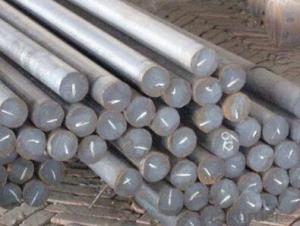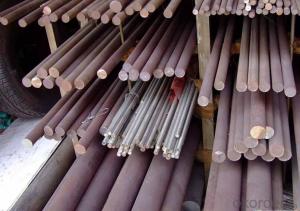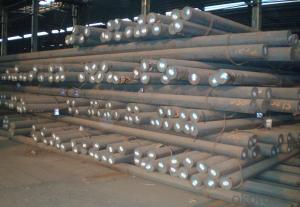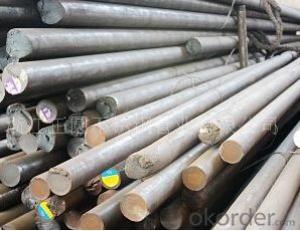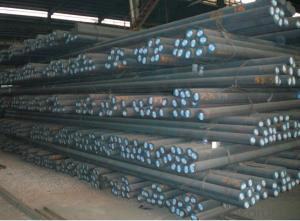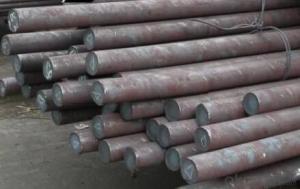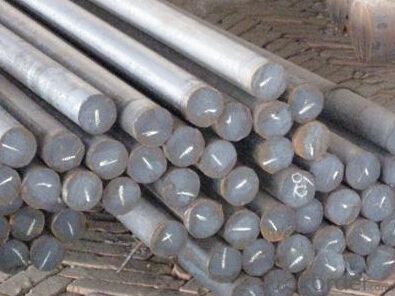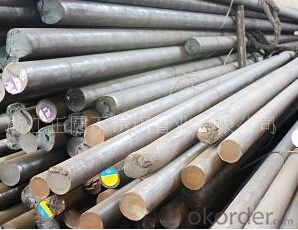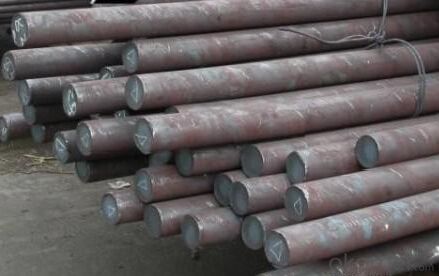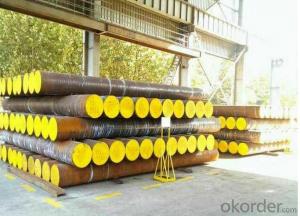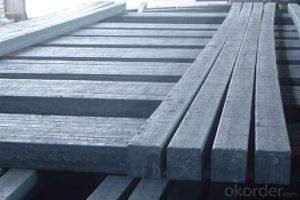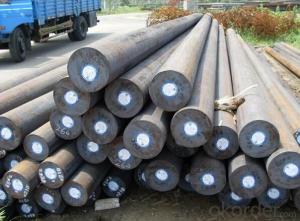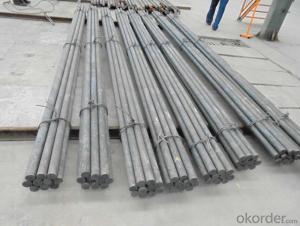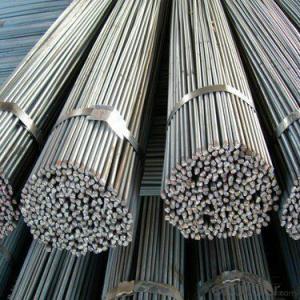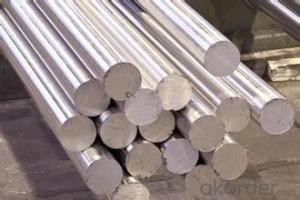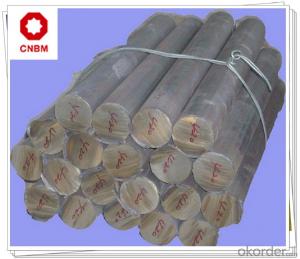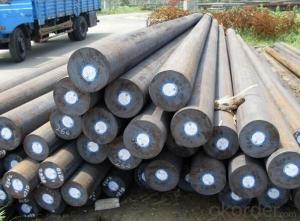Grade Q235B Round Bars-Carbon Round Bar -Alloy Round Bar
- Loading Port:
- Shanghai
- Payment Terms:
- TT OR LC
- Min Order Qty:
- 3 m.t.
- Supply Capability:
- 100000 m.t./month
OKorder Service Pledge
OKorder Financial Service
You Might Also Like
Specification
Grade Q235B Round Bars-Carbon Round Bar -Alloy Round Bar
Details Information of Grade Q235B Round Bars-Carbon Round Bar -Alloy Round Bar
| Name | SAE1045 Carbon Steel Round Bar |
| Shape | Round Bar/Square Bar/Flat Bar/Plate/Wire |
| Standard | GB/ASTM/SAE/AISI/DIN/JIS/EN/BS |
| Surface Treatment: | Black/Peeling/Polished/Machined |
| Delivery Condition: | Hot Rolled or Forged/Peeled or Black Surface |
| Test | SGS/UT 100% Elements Testing |
| Certificate: | ISO/Mill Certificate |
| Service: | 24 hours online service / |
| more than 20 years trading and manufacture | |
| Quality Assurance: | the third party inspection, such as SGS, BV, TUV…etc. is acceptable |
| Packaging Details: | Seaworthy Packaging or as per customer's packing instruction |
| Carbon structure round bar | Q195 Q235A Q235B 10# 20#-55# S45CB |
| Low alloy high strength round bar | Q345A/Q345C/Q345D Q345B Q345E |
| Alloy structure round bar | SAE51B20 20Cr 40Cr 40CrV 20CrMo/30CrMo/35CrMo/42CrMo 20CrMoA/30CrMoA/35CrMoA/42CrMoA/42Cr ML20CrMo/ML30CrMo/ML35CrMo/ML42CrMo B7/SCM435-440 20MnTiB 20CrMnMo 20CrMoH 42CrMoH 40MnB/40MnBH 30Mn2-40Mn2 27SiMn 50CrVA 30CrMnTi |
| Pinion steel | 20CrMnTi 20CrMnTiH 20CrMnTiHCS/20CrMnTiHLD Q20CrMnTi-1/Q20CrMnTi-2 |
| Sucker rod | 20-35CrMoA |
| Free-cutting steel | GT1215S |
| Spring steel | 60Si2MnA 65Mn |
| Ball bearing steel | GCr15 |
Chemical Composition of Grade Q235B Round Bars-Carbon Round Bar -Alloy Round Bar
| C | Si | Mn | P | S | Cr | Ni | Cu |
| 0.17-0.24 | 0.17-0.37 | 0.35-0.65 | ≤0.035 | ≤0.035 | ≤0.25 | ≤0.25 | ≤0.25 |
| Tensile strength (σb/MPa) | Yield strength (σb/MPa) | Elongation (δ5/%) |
| ≥410(42) | ≥245(25) | ≥25 |
Company Introduction of Grade Q235B Round Bars-Carbon Round Bar -Alloy Round Bar
CNBM International Corporation is the most import and export platform of CNBM group(China National Building Material Group Corporation) ,which is a state-owned enterprise, ranked in 270th of Fortune Global 500 in 2015.
With its advantages, CNBM International are mainly concentrate on Cement, Glass, Iron and Steel, Ceramics industries and devotes herself for supplying high quality series of refractories as well as technical consultancies and logistics solution.
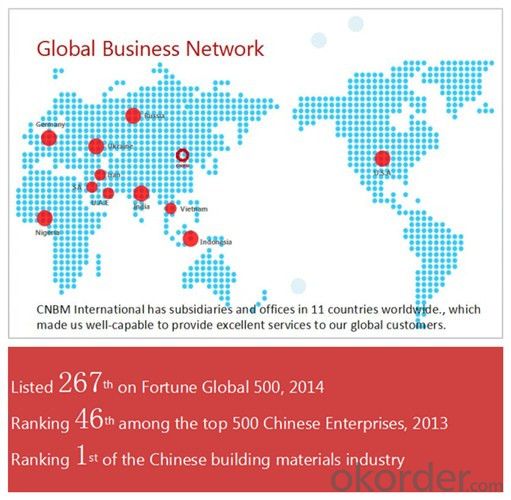
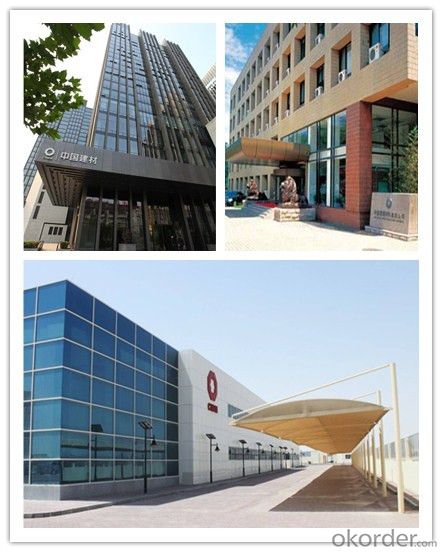
Certificates of Grade Q235B Round Bars-Carbon Round Bar -Alloy Round Bar
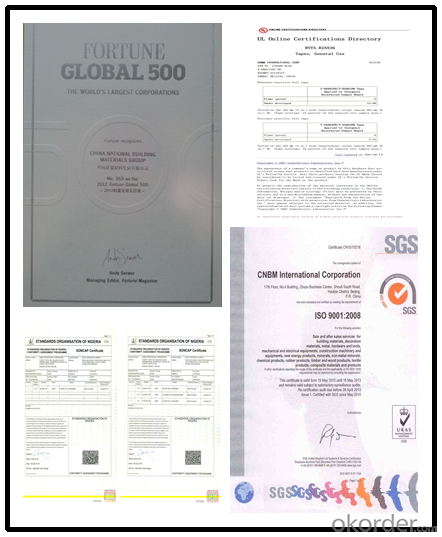
Packaging & Delivery of Grade Q235B Round Bars-Carbon Round Bar -Alloy Round Bar
Packaging Detail | Sea worthy packing /as per customer's packing instruction |
Delivery Detail | 15 ~ 40 days after receiving the deposit |
Products show of Grade Q235B Round Bars-Carbon Round Bar -Alloy Round Bar
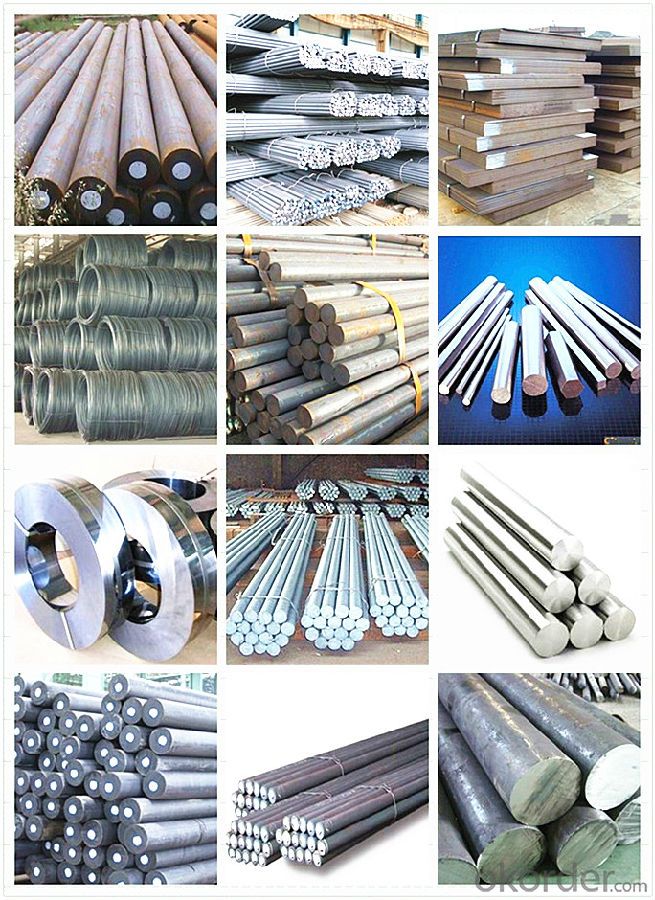
FAQ
Are you a trading company or manufacturer? | Manufacturer |
What’s the MOQ? | 3 metric ton |
What’s your delivery time? | 15-35 days after downpayment received |
Do you Accept OEM service? | Yes |
what’s your delivery terms? | FOB/CFR/CIF |
What's the Payment Terms? | 30% as deposit,70% before shipment by T/T |
Western Union acceptable for small amount. | |
L/C acceptable for large amount. | |
Scrow ,Paybal,Alipay are also ok | |
Why choose us? | Chose happens because of quality, then price, We can give you both. Additionally, we can also offer professional products inquiry, products knowledge train (for agents), smooth goods delivery, excellent customer solution proposals. |
What's your available port of Shipment? | Main Port, China |
What’s your featured services? | Our service formula: good quality+ good price+ good service=customer's trust
|
Where are your Market? | Covering more than 160 countries in the world |
- Q: How does special steel contribute to the waste management industry?
- Special steel contributes to the waste management industry by providing durable and corrosion-resistant materials for the construction of waste handling equipment and infrastructure. Special steel is used to manufacture waste containers, compactors, shredders, and incinerators, ensuring their longevity and efficiency in handling waste. Additionally, special steel is utilized in the construction of waste treatment plants and landfill facilities, providing structural strength and resistance to harsh environmental conditions. Overall, special steel plays a crucial role in enhancing the effectiveness and sustainability of waste management practices.
- Q: Can special steel be used for making cutting tools?
- Yes, special steel can be used for making cutting tools. Special steel alloys, such as tool steel, are specifically designed and manufactured to possess excellent wear resistance, hardness, toughness, and high temperature stability, making them ideal for producing cutting tools. These cutting tools include saw blades, drills, milling cutters, knives, and other sharp-edged instruments used in various industries like manufacturing, construction, metalworking, woodworking, and more. The unique properties of special steel allow cutting tools to retain their sharpness, withstand high cutting forces, and perform effectively and efficiently for extended periods.
- Q: Can special steel be used for musical instruments?
- Yes, special steel can be used for musical instruments. Steel alloys such as stainless steel or carbon steel are commonly used in the construction of certain musical instruments, particularly those requiring durability and resistance to corrosion. Examples include steel drums, certain percussion instruments, and parts of brass instruments like trumpets.
- Q: What are the properties of wear-resistant stainless steel?
- Wear-resistant stainless steel has several properties that make it highly effective in resisting wear and tear. Firstly, it has a high hardness level, which allows it to withstand abrasive forces and maintain its shape under heavy loads. Additionally, it exhibits excellent corrosion resistance, preventing rust or degradation even in harsh environments. This type of stainless steel also possesses good impact resistance, meaning it can withstand sudden impacts without cracking or breaking. Furthermore, wear-resistant stainless steel typically has a low coefficient of friction, reducing frictional forces and minimizing wear when in contact with other materials. Overall, these properties make wear-resistant stainless steel a durable and reliable choice for applications where wear and tear are major concerns.
- Q: What are the different types of special steel?
- There are several different types of special steel, including stainless steel, tool steel, high-speed steel, alloy steel, and carbon steel. Each type has specific properties and characteristics that make it suitable for different applications and industries.
- Q: How does special steel contribute to the energy sector?
- Special steel contributes to the energy sector by providing high-strength materials that are essential for the construction of various energy infrastructure projects. It is used in the manufacturing of turbines, generators, and power transmission equipment, ensuring efficient energy production and distribution. Additionally, special steel is crucial in the construction of pipelines and storage tanks for the oil and gas industry, enhancing their durability and safety. Overall, the use of special steel in the energy sector plays a vital role in supporting reliable and sustainable energy production.
- Q: What are the different types of corrosion that special steel can encounter?
- Special steel can encounter several different types of corrosion, including: 1. Uniform corrosion: This is the most common type of corrosion, where the entire surface of the steel corrodes evenly. It usually occurs when the steel is exposed to an aggressive environment, such as a corrosive chemical or high humidity. 2. Pitting corrosion: Pitting corrosion is characterized by localized corrosion attack in the form of small pits or cavities on the steel surface. It can occur due to the presence of chloride ions or other aggressive substances, and it can be particularly detrimental as it can lead to the formation of cracks. 3. Crevice corrosion: Crevice corrosion occurs in narrow gaps or crevices between steel surfaces, such as junctions, gaskets, or under deposits. It is caused by the restricted access of oxygen and the accumulation of corrosive agents, leading to localized corrosion and potential damage. 4. Galvanic corrosion: Galvanic corrosion occurs when two dissimilar metals are in contact with each other in the presence of an electrolyte. In special steel, this can happen when it is in contact with another metal in a corrosive environment, resulting in accelerated corrosion of the less noble metal. 5. Stress corrosion cracking: This type of corrosion occurs due to the combined action of tensile stress and a corrosive environment. It can cause the steel to crack and fail, even under relatively low stress levels. Special steel is often susceptible to stress corrosion cracking in specific environments, such as high chloride or acidic solutions. 6. Intergranular corrosion: Intergranular corrosion occurs along the grain boundaries of steel, usually due to the segregation of impurities during the steel's manufacturing process. It can weaken the material and lead to premature failure. To prevent or mitigate these types of corrosion, special steel can be treated with various corrosion-resistant coatings, such as paints, metallic coatings, or alloys with high resistance to corrosion. Additionally, proper material selection, design considerations, and regular maintenance can also help minimize the risk of corrosion in special steel applications.
- Q: What is the impact of impurities on the properties of special steel?
- Impurities in special steel can have a significant impact on its properties. These impurities can affect the steel's strength, toughness, corrosion resistance, and overall performance. For instance, excessive levels of impurities like sulfur and phosphorus can reduce the steel's ductility and make it more prone to cracking. Similarly, high amounts of carbon impurities can affect the steel's hardness and make it more brittle. Therefore, controlling and minimizing impurities is crucial in ensuring that special steel meets the desired quality and performance requirements.
- Q: What are the specific requirements for special steel used in the railway track industry?
- The safety, durability, and efficiency of railway tracks in the industry require special steel that meets specific requirements. Firstly, the steel used must possess high tensile strength to withstand the heavy loads and constant stress imposed by trains. This strength ensures the tracks maintain their shape and prevent deformation, allowing for smooth and stable train movement. Secondly, the steel must exhibit exceptional wear resistance due to the significant friction and wear between train wheels and tracks. It should withstand this wear and tear, minimizing the need for frequent maintenance and replacement. Thirdly, the steel must possess good fatigue resistance as trains exert repetitive loads on the tracks. Without adequate fatigue resistance, the steel may fail under cyclic loading, posing a risk of accidents. Fatigue resistance ensures the tracks remain intact and safe for extended periods. Furthermore, the steel must have high corrosion resistance to withstand exposure to various environmental and weather conditions. Moisture, temperature variations, and corrosive elements can cause rust and corrosion, making it vital for the steel to resist these effects. Additionally, the steel used in the railway track industry must meet specific dimensional and geometric requirements. This includes precise dimensions, straightness, and alignment to ensure proper installation and alignment of the tracks, enabling smooth and safe train operations. Overall, meeting the specific requirements for special steel in the railway track industry is crucial for ensuring safety, longevity, and efficiency. It allows for smooth and reliable train transportation, contributing to the overall success of the railway industry.
- Q: What are the main characteristics of magnetic steel?
- The main characteristics of magnetic steel include its ability to be magnetized and retain its magnetism, high magnetic permeability, high saturation magnetization, and low coercivity. It is commonly used in applications such as transformers, motors, and magnetic core materials.
Send your message to us
Grade Q235B Round Bars-Carbon Round Bar -Alloy Round Bar
- Loading Port:
- Shanghai
- Payment Terms:
- TT OR LC
- Min Order Qty:
- 3 m.t.
- Supply Capability:
- 100000 m.t./month
OKorder Service Pledge
OKorder Financial Service
Similar products
Hot products
Hot Searches
Related keywords
